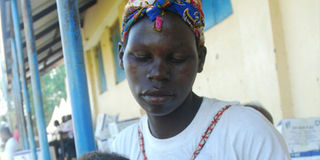Akello battles odds to raise her twins

Dorcus Arach with one of the twins affected by vitiligo . PHOTO BY TOBBIAS J. OWINY
What you need to know:
Abandoned: When she gave birth to twins with discoloured skin, Dorcus Arach’s husband took off, leaving her to fend for the babies. She spoke to Tobbias Jolly Owiny about her struggles.
When Dorcus Arach, 23, a resident of Lakwatomer, Koro Sub County, Oyam District first held her newborn babies in October 2015, she knew there would be trouble.
At the maternity unit at Aber Hospital in Oyam District before she was discharged, she looked at the eyes of her new twins who had pale skin, blonde hair and blue eyes.
It was already a mistake according to her husband Thomas Okot, a boda-boda rider living in Elegu (Uganda-South Sudan border) who considered the birth a ‘bad omen’.
“He simply told me I had slept with another man to produce those children who had unimaginable patches all over their skin,” Arach said as she pulled her head scarf and wiped tears that slowly rolled down her cheeks.
The twins recently made two years but Arach is not sure what afflicts her children and what it means to their health.
Causes of vitiligo
Vitiligo is a long-term condition in which growing patches of skin lose their colour and it affects people of any age, gender, or ethnicity.
The patches appear when melanocytes (cells responsible for producing the skin pigment, melanin, which gives skin its colour) within the skin die off. It can also affect the eyes, the inside of mouth, and the hair and in most cases, the affected areas remain discoloured for the rest of the person’s life.
The causes of Vitiligo are unclear although a number of factors are said to be responsible; an autoimmune disorder in which the immune system becomes overactive and destroys the melanocytes, a genetic oxidative stress imbalance, a neural cause and heredity.
Arach’s husband Okot soon sold their family estate to buy a motorcycle and relocated to Elegu in Amuru District where he married again.
The onset of her trouble
Meeting Okot on the streets of Gulu town on a cool afternoon in April 2012 was a great deal to Arach since it was followed by an introduction a month later. The two took up their new life as husband and wife immediately.
Failure to conceive a year into the affair seemed to have pinched her husband hard. At times he refused to provide for the family and would fight her when she failed to serve him food.
“We lived in Pece Division, Gulu town at that time (2014) and it was only when our landlord threatened to report him to police when he gave me Sh15,000 after a week of no food,” she said.
“I was desperate to settle in my new family and I only got to know that he was just a gambler on the streets of Gulu town a year into the affair when he confessed after a fight,” she recalls.
The hostile environment continued till the end of 2014. “When I conceived, I was relieved because he started providing in the house and he beat me no more. He even took me to their village in Lakwatomer in Omoro District.”
‘Infected’ twins shatter marriage
During labour, Okot stayed by her side. He even went to Lira town to buy necessities to welcome their child.
He did not know that she would produce twins and more so affected with Vitiligo.
“When he returned to the hospital I had already delivered but his looks changed as he struggled to react. I knew I was in a very difficult condition,” she said.
Okot and Arach were told by the doctor that either of them carried a gene of Vitiligo such that each time they had a child there was a 25 per cent chance the child would have it.
Her husband abandoned then in the hospital and rode back home to Omoro.
“We looked for him in vain in the vicinity of the hospital till my aunt who attended to me offered her money to pay for my boda-boda fare to travel back home the next day,” she said.
Arach’s bitter husband waited for her at home to beat her up.
“He accused me of producing the twins with another man in our village and asked me to confess but when I failed, he pounced on me. My bleeding nose and my weak body did not discourage him from beating me even when I fell down,” she recalled.
When he was summoned by the village LC1 chairman, Okot had already fled to Gulu town and Arach was rushed to Lakwana Health Centre III with a bloody nose and vaginal bleeding.
Abandoned at home
In the second month after the birth of the twins, Ojok resurfaced. “I was in the garden when he packed all his clothing in a bag and returned to Gulu town. One of his friends tipped me that he was renting in town.”
To Arach, there was no meaning in reporting to police or pursuing a man who was no longer interested in her but to consider other options.
“I told myself it was okay although it was not. I took on the role of provider. Whenever I called him, he said he would kill me if I continued tracing his steps. I then relaxed.”
However, she did not know that Okot’s return that day was his last sight at home. He had come to pick money from his parents to go and buy a new motorcycle that would be deployed for boda-boda business to support the family.
“Only six months ago, one of his best friends showed me his pictures and told me he married another wife and now lives in Elegu, Amuru District,” she says.
Arach’s dilemma remains the care of her abandoned babies and footing the bills since she is alone and is engaged in subsistence farming and other petty trade to afford a meal for the twins. According to Jennifer Oketta of Sweet Sleep, a local organisation in Gulu district that supports children and mothers in vulnerable situations Arach has been enrolled for support under their programme.
What is vitiligo?
Vitiligo is a long-term problem in which growing patches of skin lose their colour and it affects people of any age, gender, or ethnicity. The patches appear when melanocytes (cells responsible for producing the skin pigment, melanin, which gives skin its color) within the skin die off. It can also affect the eyes, the inside of mouth, and the hair.




